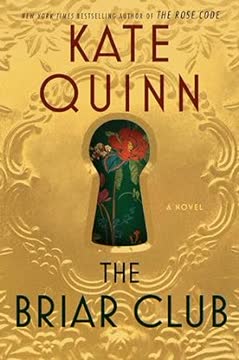Plot Summary
Arrival in a Land Without Rubble
Eva Gerst and Brigit Heidelmann, two young German women, step off a ship into postwar New York, a city untouched by the devastation they've left behind. Eva is haunted by the trauma of war and the secrets she carries, while Brigit is mute, broken by her experiences. They are not just refugees seeking safety—they are fugitives from their own pasts, carrying forged papers and a mission that Eva cannot share. America is supposed to be a land of hope, but Eva quickly learns that prejudice, suspicion, and the ghosts of the old world are not so easily left behind. She is here for justice, not hope, and the weight of her purpose is sewn into the very fabric of her clothes.
The Past That Won't Die
Inge von Emmerich, Eva's former self, grows up in a privileged German family, indoctrinated into Nazi ideology. Her life is a swirl of club meetings, music lessons, and the constant pressure to be strong, obedient, and racially pure. Her father, a respected doctor, is a man of science and cruelty, and her mother is cold, jealous, and abusive. Inge's world is one of rigid expectations and hidden violence, where love is conditional and weakness is despised. The war's end brings chaos, loss, and the shattering of everything she thought she knew, forcing her to confront the monstrous reality behind her family's power.
The League of German Girls
Inge's life is shaped by the League of German Girls, the Nazi youth organization that teaches her to value purity, obedience, and sacrifice for the Fatherland. The club is a microcosm of Nazi society, where girls are trained to be mothers of the next generation and to believe in the superiority of their blood. Inge's friendships, rivalries, and sense of self are all filtered through this lens. The club's rituals and songs mask the underlying violence and control, and even as Inge begins to question, she is swept along by the collective fervor and the fear of being weak or different.
The Rotten Deal
After the war, Eva is forced into a deal with a shadowy American agent known as Mr. Cruickshanks. The Americans want her father, Dr. von Emmerich, a Nazi scientist whose research into mind control is coveted by both the US and the Soviets. Eva is to help them find him, in exchange for her own safety and that of Brigit. But the deal is rotten—she is being used as bait, and the justice she seeks is at odds with the interests of her handlers. Eva is trapped between powers, her every move watched, her every choice fraught with danger and moral compromise.
Escape and Survival
As Germany collapses, Inge flees the violence and chaos, dragging the traumatized Annemarie (Brigit) with her. They witness the horrors of war: bombings, mass graves, rape, and the breakdown of all order. Inge's family is destroyed—her mother kills her brothers and herself, her home is reduced to rubble, and Inge is forced to confront the truth about her father's crimes. She becomes Eva Gerst, forging a new identity, and survives by her wits, her ruthlessness, and her determination to protect Annemarie at all costs.
The New World's Promises
In New York, Eva and Brigit are taken in by the American Friends Service Committee at Powell House, a Quaker-run refuge for immigrants. Here, Eva encounters kindness, diversity, and a vision of America that is both inspiring and naïve. She is assigned a "friend," Jake Katz, a Jewish volunteer whose family perished in the Holocaust. The community offers her a chance at belonging, but Eva knows she is living a lie. The past is never far behind, and the cost of safety is silence, vigilance, and the constant fear of exposure.
The Shadow of Justice
Eva's mission is complicated by the presence of multiple agents—American, Soviet, and others—each with their own agenda. She discovers that her father is alive, hiding in America, and that both Cruickshanks and the Soviets want his research for their own ends. Eva is torn between her desire for justice—true justice, not the perverted kind offered by her handlers—and her fear of what will happen if her father is caught. The lines between victim and perpetrator, justice and revenge, become increasingly blurred.
The Experiment's Legacy
Eva uncovers the horrifying truth about her own past: she is Anna Ptaszynska, a Polish child stolen by the Nazis and subjected to her father's experiments in mind control. Brigit, once Annemarie, is her sister, also taken and reprogrammed to be a model German girl. The files reveal a legacy of abuse, manipulation, and the erasure of identity. Eva's memories return in fragments—of violence, of being forced to kill, of the bird she was made to squeeze. The experiment was not just scientific; it was personal, and its scars run deep.
The Hunt for the Doctor
With Jake's help, Eva tracks down her father, now living under an assumed name. The confrontation is fraught with danger—Rolf, her father's loyal enforcer, is also hunting her, and the Soviets are closing in. Eva must decide whether to kill her father herself, hand him over to the Americans or Soviets, or find another way. The moment of reckoning is a test of everything she has become, and the choice she makes will define her future.
The Truth About Anna
Eva's struggle is not just with her father, but with herself. The files, the memories, and the lies she has been told all her life converge in a moment of clarity. She realizes that the power to choose—to forgive, to seek justice, to define herself—is hers alone. She is not just a victim or a tool; she is a survivor, and her identity is not determined by her abusers. The act of letting the bird go becomes a symbol of her freedom.
The Price of Memory
Brigit undergoes surgery to repair the physical damage done to her brain, and as she recovers, her memories and personality begin to return. The process is painful for both sisters—Brigit is angry, confused, and rejects Eva, blaming her for the past. Eva must accept that healing is not simple, and that the scars of trauma run deep. The cost of memory is high, but it is also the only path to wholeness.
The Choice of Justice
In the final confrontation, Eva chooses not to kill her father, but to let him face the consequences of his actions. The Soviets take him away, promising a trial, and Eva is left to grapple with the meaning of justice. She realizes that true justice is not about revenge, but about breaking the cycle of violence and control. She lets go of the gun, the knife, and the burden of being judge and executioner.
The Wall Comes Down
With her father gone and Brigit estranged, Eva must build a new life in America. She finds work, studies music, and begins to form connections with others. The wall that separated her from the future begins to crumble, brick by brick, as she learns to live with her scars and to accept love and kindness. The process is slow, painful, and uncertain, but it is real.
The Cost of Freedom
Eva's journey is marked by loss—of family, of innocence, of the illusion of safety. She must learn to live with guilt, to accept that some wounds will never fully heal, and to find meaning in the freedom she has won. The cost of freedom is high, but it is also the only way forward.
The Future Behind the Wall
As Eva begins to imagine a future for herself, she is reunited with Jake, who has returned from abroad. Their love is not simple or easy, but it is a choice—a commitment to building something new from the ruins of the past. Eva chooses to live, to love, and to hope, even as she carries the weight of memory and loss.
The Bird Flies Free
The story ends with Eva releasing the bird—a symbol of her own freedom, her refusal to be defined by her abusers, and her embrace of a new life. She is no longer Inge, or Anna, or just a survivor; she is Eva, and she belongs to herself. The past will always be a part of her, but it no longer controls her. She is free to fly.
Characters
Eva Gerst / Inge von Emmerich / Anna Ptaszynska
Eva is the heart of the novel—a young woman whose identity has been shattered and rebuilt by war, trauma, and the manipulations of those in power. Born Anna Ptaszynska, a Polish child stolen by the Nazis, she is reprogrammed as Inge von Emmerich, the daughter of a prominent Nazi doctor. After the war, she becomes Eva Gerst, a refugee in America, haunted by guilt, anger, and the need for justice. Eva is fiercely intelligent, resourceful, and determined, but also deeply wounded. Her journey is one of self-discovery, as she confronts the truth about her past, her family, and her own capacity for both violence and forgiveness. Her relationship with Brigit is central—she is both protector and penitent, seeking redemption through care. Eva's development is a gradual reclaiming of agency, identity, and hope.
Brigit Heidelmann / Annemarie Toberentz
Brigit, once Annemarie, is Eva's younger sister, also stolen and reprogrammed by the Nazis. She is the embodiment of innocence destroyed by war—mute, childlike, and broken by trauma. Her recovery is slow and painful, marked by moments of violence and confusion. Brigit's journey mirrors Eva's: she must reclaim her identity, confront the truth of her past, and learn to live with the scars. Her relationship with Eva is fraught with blame, anger, and ultimately, the possibility of healing. Brigit is both a victim and a survivor, her fate a testament to the resilience of the human spirit.
Dr. Otto von Emmerich (The Doctor)
The Doctor is the novel's central antagonist—a brilliant, manipulative, and utterly amoral scientist whose experiments in mind control leave a legacy of suffering. He is both father and tormentor to Eva and Brigit, capable of charm and cruelty in equal measure. His belief in the supremacy of science and the right to control others is unshakable, and he is willing to sacrifice anyone, including his own "children," for his goals. The Doctor's psychological hold over Eva is profound, and their final confrontation is a battle for her soul as much as for justice. He is a symbol of the seductive power of evil cloaked in reason.
Rolf Steiner
Rolf is the Doctor's right hand—a former SS officer, guard, and would-be suitor to Inge/Eva. He is driven by a need for approval and belonging, easily manipulated by those in power. Rolf's loyalty is absolute, but it is also self-serving and violent. He is both a victim of the system and a perpetrator of its worst crimes. His obsession with Eva is twisted, and his end is a consequence of his inability to see beyond the ideology that shaped him.
Jake Katz
Jake is Eva's assigned "friend" at Powell House—a young Jewish man whose family was destroyed by the Holocaust. He is witty, compassionate, and persistent, offering Eva a vision of a different kind of life. Jake's own wounds run deep, but he chooses to respond with kindness, humor, and a commitment to justice. His relationship with Eva is transformative for both, challenging them to confront their pasts and imagine a future together. Jake is a counterpoint to the darkness of Eva's world—a reminder that love and decency can survive even the worst horrors.
Mr. Cruickshanks
Mr. Cruickshanks is the face of American intelligence—a man who offers Eva a deal she cannot refuse, but whose motives are as self-serving as those of the Nazis and Soviets. He is clever, ruthless, and utterly pragmatic, willing to use anyone and anything to achieve his goals. Cruickshanks embodies the moral compromises of the postwar world, where justice is often sacrificed for power. His relationship with Eva is adversarial, marked by threats, manipulation, and a grudging respect.
The Man with Shiny Shoes
The man with shiny shoes is a Soviet operative, always watching, always one step behind or ahead. He is a reminder that the struggle for power did not end with the war, and that the victims of one regime can easily become the tools of another. His presence is a constant threat, and his ultimate role in the Doctor's fate is ambiguous—justice, revenge, or simply another form of control.
Bets (Elizabeth Whittlesby)
Bets is a volunteer at Powell House, responsible for helping Eva and Brigit adjust to life in America. She is practical, optimistic, and unfailingly kind, offering support without judgment. Bets represents the best of the new world's promises—a belief in the possibility of redemption, healing, and community. Her faith and generosity are a lifeline for Eva, even as Eva struggles to accept them.
Martha (Mother Martha)
Martha is the wise, steady presence at Powell House, guiding the community with patience and understanding. She is a source of comfort and counsel for Eva, helping her navigate the complexities of her new life. Martha's belief in forgiveness and the possibility of change is both a challenge and an inspiration to Eva.
Annemarie's Doctor (Dr. Forrester)
Dr. Forrester is the neurosurgeon who performs the operation that allows Brigit to begin healing. He is competent, compassionate, and open-minded, willing to see beyond the surface to the person beneath. His role is crucial in giving Brigit—and Eva—a chance at a new life.
Plot Devices
Dual Identity and Fragmented Memory
The novel's structure is built around Eva's multiple identities—Anna, Inge, Eva—and her struggle to reconcile them. Fragmented memory, both as a result of trauma and deliberate manipulation, is a central device. The gradual revelation of the truth about Anna Ptaszynska, the Doctor's experiments, and Brigit's identity creates suspense and emotional depth. The use of flashbacks, recovered memories, and documents (files, photographs) allows the reader to piece together the puzzle alongside Eva.
The Quest for Justice
Eva's pursuit of justice for her father's victims is the engine of the plot, but the meaning of justice is constantly questioned. Is it revenge, legal accountability, or something more transformative? The competing interests of the Americans, Soviets, and Eva herself create a web of conflicting loyalties and ethical challenges. The final choice—to kill or not to kill, to let go or to hold on—serves as the novel's climax and moral fulcrum.
The Bird Motif
The recurring image of the bird—first as a victim of the Doctor's experiments, then as a symbol of Eva's own captivity and eventual liberation—serves as a powerful metaphor. The act of letting the bird go becomes the turning point in Eva's journey, representing her refusal to be defined by her abusers and her embrace of agency.
Foreshadowing and Parallels
**Mi
Last updated:
FAQ
Synopsis & Basic Details
What is Bluebird about?
- A Post-War Identity Quest: Bluebird follows Eva Gerst, a young German refugee arriving in New York after WWII, burdened by a secret mission and a traumatized companion, Brigit. Eva carries forged papers and a hidden agenda: to find her father, a Nazi scientist, and deliver justice for his horrific war crimes.
- Unveiling a Fragmented Past: The narrative interweaves Eva's present with flashbacks to her past as Inge von Emmerich, a privileged German girl indoctrinated into Nazi ideology, and later, the shocking truth of her original identity as Anna Ptaszynska, a Polish child subjected to her father's mind-control experiments. This complex layering explores themes of identity, memory, and the lasting scars of war.
- Moral Compromises & Unexpected Allies: As Eva navigates a new world of prejudice and unexpected kindness at Powell House, a Quaker-run refuge, she becomes entangled with American and Soviet intelligence agencies, all vying for her father's dangerous research. Her quest for justice is complicated by the moral ambiguities of the Cold War and her evolving relationship with Jake Katz, a Jewish volunteer whose family was lost in the Holocaust.
Why should I read Bluebird?
- Unflinching Historical Depth: Bluebird offers a gripping and meticulously researched exploration of the lesser-known historical realities of post-WWII Germany and the early Cold War, including the chilling Project Bluebird (mind control experiments) and Lebensborn (stolen children), providing a unique lens on human resilience and complicity.
- Complex Moral Dilemmas: The novel challenges readers with profound ethical questions about justice, revenge, forgiveness, and the nature of evil. It delves into the psychological toll of trauma and indoctrination, forcing characters and readers alike to confront uncomfortable truths about human nature and societal responsibility.
- Masterful Character Transformation: Eva's journey through multiple identities—from indoctrinated Nazi youth to traumatized victim to determined survivor—is a powerful study in character development. Her internal battles and external struggles create a deeply empathetic and compelling protagonist, making her quest for self-acceptance and justice truly resonant.
What is the background of Bluebird?
- Post-WWII Geopolitical Tensions: The story is set in the immediate aftermath of World War II (1945-1947), a period marked by the collapse of Nazi Germany, the division of Europe into Allied occupation zones, and the nascent Cold War rivalry between the United States and the Soviet Union. This backdrop fuels the clandestine hunt for Nazi scientists and their dangerous research.
- Real-World Mind Control Programs: Bluebird is inspired by actual historical programs like Project Bluebird (later MK-Ultra), where the US government, fearing Soviet advancements, secretly continued human experimentation on mind control using former Nazi doctors. This dark historical context underpins Dr. von Emmerich's character and the high stakes of his capture.
- The Stolen Children of Lebensborn: A significant historical element is the Nazi Lebensborn program, which involved kidnapping "racially valuable" children from occupied territories, particularly Poland, and indoctrinating them into German identity. This horrific practice directly informs the intertwined backstories of Eva (Anna Ptaszynska) and Brigit (Annemarie Toberentz), highlighting the profound trauma of identity erasure.
What are the most memorable quotes in Bluebird?
- "Fair is fair.": This recurring phrase, often uttered by characters like the second mate or Eva's father, initially justifies transactional cruelty or rigid adherence to rules. Its repetition highlights the perversion of justice under Nazi ideology and Eva's later struggle to redefine true fairness, contrasting with the unconditional kindness she encounters at Powell House.
- "You can change your name. But it doesn't change who you are.": Spoken by Eva after Mrs. Angel reveals her chosen name, this quote encapsulates Eva's central conflict of fragmented identity. It foreshadows her journey to reconcile her past selves (Anna, Inge) with her present (Eva), ultimately realizing that true identity is chosen, not imposed, and that transformation is possible despite one's origins.
- "It would have taken less strength to shoot you. But I am not your judge.": Eva's powerful declaration to her father during their final confrontation reveals her ultimate choice to break the cycle of violence and control. This quote signifies her personal triumph over vengeance, demonstrating that true strength lies in choosing a path beyond the monstrous teachings of her past, even when it's the harder choice.
What writing style, narrative choices, and literary techniques does Sharon Cameron use?
- Dual Identity and Fragmented Memory: Cameron employs a compelling dual narrative structure, alternating between Eva's present-day experiences in America and her past as Inge in Nazi Germany. This fragmented perspective, often mirroring Eva's own fractured memory, slowly reveals the layers of her identity and the traumatic events that shaped her, building suspense and emotional depth.
- Sensory-Rich and Evocative Prose: The author's writing is highly descriptive, immersing the reader through vivid sensory details. From the "smell of hot bullets" to the "acrid, stinking" smoke of bombed cities, and the contrasting "smell of bread" and "clean gloves" in America, Cameron uses sensory language to ground the reader in Eva's experiences and underscore the stark differences between her past and present worlds.
- Symbolism and Recurring Motifs: Cameron masterfully weaves in rich symbolism, particularly the recurring "bird motif," which evolves from a symbol of the Doctor's cruel experiments and Eva's forced obedience ("squeeze the bird") to her ultimate liberation and chosen freedom ("the bird flies free"). Other motifs like "walls," "holes," and "fairness" subtly reinforce the novel's core themes of confinement, loss, and justice.
Hidden Details & Subtle Connections
What are some minor details that add significant meaning?
- The Dead Rat in the Laundry Bag: Early on the ship, Eva reveals she put a dead rat in the second mate's laundry bag as revenge for his exploitation. This seemingly minor detail subtly foreshadows Eva's hidden ruthlessness and her capacity for calculated, quiet acts of defiance, hinting at the deeper, darker aspects of her past as Inge and Anna.
- Mama's Jealousy of Annemarie: Inge observes her mother's jealousy of Annemarie's "tall, blond, and perfect" Aryan appearance, contrasting with Inge's darker features. This detail subtly hints at Annemarie's true non-Germanic origins (as a stolen Polish child) and Mama's deep-seated adherence to Nazi racial ideals, which ironically makes her blind to the truth about her "perfect" adopted daughter.
- The "Invisible Fence" in New York: Upon arrival, Eva notes how the people waiting for the bus are "divided neatly in two. White faces to one side, brown to the other. As if there's a fence Eva can't see." This detail immediately shatters the illusion of America as a perfect, prejudice-free haven, revealing its own racial segregation and challenging Eva's preconceived notions of a "new world."
What are some subtle foreshadowing and callbacks?
- Kurt's Car Key and the Toolshed: Inge's early interactions with Kurt, including his teaching her to drive and their secret kisses in the toolshed, are seemingly innocent teenage rebellion. However, Kurt later leaves the car key for Inge, enabling her escape, and the toolshed becomes a symbol of hidden secrets and forbidden acts, foreshadowing the deeper, more dangerous secrets Inge/Eva will uncover.
- The "File with Her Name on It": Inge's repeated curiosity about a file with her name on her father's desk subtly foreshadows the revelation of her true identity and the Doctor's meticulous documentation of his experiments. This detail builds suspense around the hidden truths of her past, which she eventually uncovers in the factory.
- Brigit's Polish Mumbling: During her sedation at the hospital, Brigit mumbles phrases like "Jaden dwa, jaden dwa" and "Ptak, ptak, ptasik" (bird, bird, little bird) in Polish. This seemingly nonsensical speech subtly foreshadows the revelation of her true Polish identity (Annemarie Toberentz as a stolen child) and her connection to Eva's own past as Anna Ptaszynska, whose name also means "little bird" in Polish.
What are some unexpected character connections?
- Annemarie's Connection to the Doctor: The revelation that Annemarie (Brigit) was also a subject of the Doctor's experiments, and that her "perfect" Aryan appearance was a result of Nazi conditioning, creates an unexpected and tragic connection to Eva's own past. It highlights the Doctor's pervasive cruelty and the shared trauma that binds the two sisters.
- Jake's Family and the Holocaust: Jake's seemingly casual mention of his family in Berlin who "didn't make it" and his uncle David's disappearance in 1934, later confirmed to be victims of the Holocaust, creates a profound and unexpected connection to Eva's Nazi past. This personal loss fuels his desire for justice and complicates his relationship with Eva, forcing them to confront their intertwined histories.
- The Multiple Mr. Cruickshanks: The existence of multiple American agents using the name "Mr. Cruickshanks" is an unexpected detail that reveals the impersonal and pervasive nature of government operations. It suggests a larger, more complex network of intelligence gathering, where individual agents are interchangeable, and their motives are often obscured, adding to the moral ambiguity of Eva's "rotten deal."
Who are the most significant supporting characters?
- Mr. Liebermann: A former Sachsenhausen prisoner, Liebermann is a crucial supporting character who provides Eva with the unvarnished truth about her father's atrocities and the camp's horrors. His whispered stories and the list of twenty-seven names he helps her memorize become the driving force behind Eva's quest for justice, transforming her from Inge to Eva Gerst.
- Mrs. Angel: A vibrant and compassionate woman from Harlem, Mrs. Angel embodies the unconditional acceptance and practical kindness of Powell House. Her chosen name, "Happy Angel," and her willingness to care for Brigit without judgment, offer a stark contrast to the rigid, conditional "love" Eva experienced in Germany, subtly influencing Eva's understanding of true belonging.
- Dr. Holtz: A Jewish psychiatrist and Holocaust survivor, Dr. Holtz becomes a mentor and surrogate father figure to Eva. His own experiences with trauma and his belief in healing and transformation provide Eva with a path forward beyond her guilt and pain. He represents the possibility of rebuilding a life of purpose and kindness, even after unimaginable suffering.
Psychological, Emotional, & Relational Analysis
What are some unspoken motivations of the characters?
- Eva's Self-Punishment: Beyond seeking justice for her father's victims, Eva's relentless pursuit of him and her willingness to endure hardship (like the potato fields or the dangerous factory visit) are subtly driven by a deep-seated guilt and a need for self-punishment. She believes she is "unworthy" of kindness or happiness, a lingering effect of her Nazi indoctrination and her complicity as Inge.
- The Doctor's Need for Validation: Dr. von Emmerich's monstrous experiments and his continued pursuit of his "science" are not just about power; they are fueled by a desperate need for intellectual validation and recognition. His desire to prove his theories, even to his "daughter," reveals a twisted ego that prioritizes scientific "progress" over human life, seeing his victims as mere "lab rats."
- Rolf's Craving for Belonging: Rolf's unwavering loyalty to the Doctor and his obsession with Inge are rooted in a profound craving for belonging and purpose, which the Nazi regime initially provided. His desperate attempts to cling to the Doctor's vision, even after the war's end, stem from a fear of being "nothing" without a cause or a master, making him easily manipulated.
What psychological complexities do the characters exhibit?
- Dual Identity and Fragmented Memory: Eva's core psychological complexity lies in her fragmented identity, a result of both deliberate mind control and extreme trauma. She dissociates from her past selves (Inge, Anna), struggling to reconcile the "good German girl" with the "killer" and the "victim." This internal battle is evident in her shifting self-perception and her difficulty accepting kindness.
- Trauma-Induced Regression and Selective Memory: Brigit's condition, initially presented as "a bad war," is revealed to be a complex mix of physical brain injury and psychological trauma. Her regression to a childlike state and her selective memory (remembering the car, but not the full horror) are psychologically realistic responses to overwhelming abuse, highlighting the brain's protective mechanisms.
- The Seduction of Ideology and Moral Blindness: Inge's initial embrace of Nazi ideology, despite her mother's abuse and her father's coldness, showcases the psychological power of belonging and perceived superiority. Her moral blindness, where "fair is fair" justifies cruelty, is a chilling complexity that she must painstakingly dismantle as Eva, confronting the monstrous reality of her past beliefs.
What are the major emotional turning points?
- The Discovery of Anna Ptaszynska's File: Reading her father's notes on Anna's "training" is a pivotal emotional turning point for Eva. It shatters her remaining illusions about her father and forces her to confront the horrifying truth of her own past, transforming her abstract quest for justice into a deeply personal and visceral one.
- Brigit's Polish Words and Diagnosis: The nurse's revelation that Brigit is speaking Polish, combined with Dr. Forrester's diagnosis of a physical brain injury, is a profound emotional shock for Eva. It shifts her understanding of Brigit's condition from purely psychological trauma (and Eva's perceived fault) to a treatable physical ailment, igniting a new hope for Brigit's recovery and a deeper understanding of their shared past.
- Eva's Choice Not to Kill the Doctor: In the summerhouse, Eva's decision to shoot the glass instead of her father is the ultimate emotional climax. This act signifies her breaking free from the cycle of violence and her father's control, choosing a path of true justice over personal revenge. It's a moment of profound agency and self-definition, allowing her to finally "let the bird go."
How do relationship dynamics evolve?
- Eva and Brigit: From Burden to Sisterhood: Their relationship begins with Eva as a fiercely protective, almost maternal figure, burdened by Brigit's care and guilt. As Brigit recovers and expresses anger, their dynamic becomes strained, reflecting the painful process of healing. Ultimately, the revelation of their sisterhood transforms their bond into one of shared identity and a deeper, albeit complex, love.
- Eva and Jake: From Suspicion to Unconditional Love: Their relationship evolves from initial wariness and Eva's calculated manipulation to a deep, unconditional love. Jake's persistence, kindness, and willingness to confront Eva's dark past, despite his own family's suffering, gradually break down her emotional walls. Their bond becomes a symbol of healing and the possibility of connection across seemingly insurmountable divides.
- Eva and Dr. von Emmerich: From Daughter to Judge: The dynamic between Eva and her father shifts dramatically from Inge's childhood obedience and longing for approval to Eva's adult confrontation and judgment. The Doctor's manipulative "love" is exposed as a tool of control, and Eva's final act of choosing not to kill him, but to let him face consequences, redefines their relationship from one of power imbalance to one of moral accountability.
Interpretation & Debate
Which parts of the story remain ambiguous or open-ended?
- The Full Extent of Anna's "Programming": While the file details the Doctor's experiments on Anna, the precise nature and lasting effects of her "conditioning" remain somewhat ambiguous. The narrative suggests that the "killer" persona was a lie, but the psychological impact of the trauma and manipulation on Eva's identity is a continuous, evolving process, leaving the reader to ponder the true depth of her psychological scars.
- The Fate of Dr. von Emmerich: Although the Soviets take the Doctor away, promising a trial, his ultimate fate is not explicitly shown. The narrative leaves it open whether he truly faces justice (as promised by the Soviet agent) or if he, like Dr. Blome, is eventually acquitted or used by another power. This ambiguity reflects the murky moral landscape of the post-war era and the often-unseen compromises made by governments.
- The Future of Eva and Brigit's Relationship: While Eva and Brigit are revealed to be sisters, and Brigit begins to recover, their relationship ends with Brigit rejecting Eva. The story leaves their future reconciliation open
Review Summary
Bluebird is a compelling historical fiction novel set after WWII, following a young German woman's journey to America. Readers praise Cameron's extensive research, complex characters, and masterful storytelling. The book explores themes of identity, redemption, and justice while shedding light on lesser-known historical events like Project Bluebird. Many reviewers found the novel emotionally impactful and difficult to put down, appreciating its blend of suspense, romance, and thought-provoking content. Some critics noted its length and pacing, but overall, the book received high praise for its unique perspective and engaging plot.
Similar Books
Download PDF
Download EPUB
.epub digital book format is ideal for reading ebooks on phones, tablets, and e-readers.















